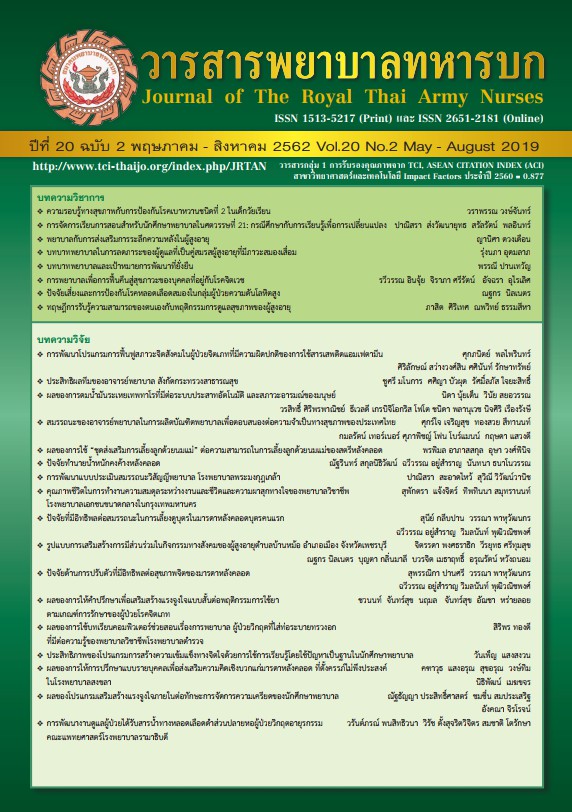Health literacy of healthy Aging among Elderly in Bangkok Metropolitan : Development and Validation of Health literacy Scale
Keywords:
Health literacy Scale, Health literacy in elderlyAbstract
Based on the physical changes for elderly into the decay of the body, these changes can affect to easily get illness, such as diabetes mellitus, hypertension, and depression. Health literacy is an important factor on developing health behavior and preventing diseases among elderly. Based upon the reviews, there has been conducted the health literacy’s scale, but no research study has been specifically designed for a Thai-version of the health literacy questionnaire for self-care (HLQFSC) among elderly. The purpose of this study was to develop and validate a Thai-version instrument measuring health literacy for self-care among elderly that covered its reliability and validity. The HLQFSC among elderly living in Bangkok was developed from Sorensen et al. (2012)’s framework and empirically validated the content by five experts for elderly concept, as well as reliability with Cronbach’s alpha coefficient as a pilot study. The HLQFSC was examined by descriptive statistics, Pearson’s correlation coefficient, and confirmatory factor analysis.
The results showed that there were 600 elderly. Most participants aged between 60-65 years of old, and 69.2% of the participants were male. The mean of total health literacy was 3.58. The final version of the HLQFSC had 22 items, with the Cronbach’s alpha coefficient of 0.950. The confirmatory factor analysis showed that the model was fitted with acceptable fit using most criteria (χ2 = 656.32, df = 205, CFI = 0.99, GFI = 0.91, TLI = 0.98, RMSEA = 0.061), and also the 4-factors model was confirmed: 1) Assess 2) Understand 3) Appraise, and 4) Apply. The Thai-version of the HLQFSC had good psychometric properties. It can be used for assessing health literacy for self-care among elderly.
Downloads
References
Bureau of Health Promotion. Elderly Health Survey Report 2013 Under the health promotion plan for the elderly and the disabled. Nonthaburi: Department of Health Ministry of Public Health; 2013. (In Thai).
Tachavijitjaru, C. Health Literacy: A key Indicator towards Good Health Behavior and Health Outcomes. Journal of The Royal Thai Army Nurses. 2018; 19: 1-11. (in Thai)
Mottus, R. et al. Towards understanding the links between health literacy and physical health. Health Psychology. 2014; 33(2): 164-173.
Mahnoush, R. et al. The relationship between functional health literacy and health promoting behaviors among older adults. Journal of Education and Health Promotion. 2015; 3: 119.
Baker, D. W. et al. Functional health literacy and the risk of hospital admission among. American Journal of Public Health. 2002; 29(8): 1278-1283.
Weiss, B. D. et al. Quick assessment of literacy in primary care: The newest vital sign. Annals of Family Medicine. 2005; 3(6): 514-522.
Baker, D. W. et al. (2007). Health literacy and mortality among elderly persons. Archives of Internal Medicine. 2007; 167: 1503-1509.
Bostock, S, & Steptoe, A. Association between low functional health literacy and mortality in older adults. BMJ, 2012; 344: e160.
Wolf, M. S., Gazmararian, J. A., & Baker, D. Health literacy and functional health status among older adults. Archives of Internal Medicine, 2005; 165(17): 1946-1952.
Cutilli, C. C. Health literacy in geriatric patients: An integrative review of the literature. Orthopaedic Nursing, 2007; 26: 43-48.
Chesser, A. K., Woods, N. K., Smothers, K., & Rogers, N. Health literacy and older adults: A systematic review. Gerontology and Geriatric Medicine. 2016; 2: 1-13.
National Assessment of Adult Literacy. The health literacy of America’s adults: Results from the 2003 National Assessment of Adult Literacy. Washington, DC: U.S. Department of Education; 2006.
WHO. Health promotion glossar. Geneva: WHO Publications; 1998.
Ratzan, S. C., & Parker, R. M. Introduction. In C, R. Seldon; et al. (Eds.), National library of medicine current bibliographies in medicine: Health literacy. Bethesda, MD: National Institutes of Health, U.S. Department of Health and Human Services; 2000.
Institute of Medicine. Health literacy: A prescription to end confusion. Washington, DC: Institute of Medicine, Board on Neuroscience and Behavioral Health, Committee; on Health Literacy; 2004.
Sorensen, K. et al. Health literacy and public health: A systematic review and integration of definitions and models. BMC Public Health. 2012; 12: 80.
Haun J, Valerio M, Mc Cormack L, Sorensen K, Paasche-Orlow MK. Health literacy measurement: An inventory and descriptive summary of 51 instruments. J Health Commun. 2014;19:302-33.
Nunnally, J. C., & Bernstein, I. H. Psychometric theory. (3rd ed.). New York: McGraw-Hill ; 1994.
Clark-Carter, D. Catalogue of parametric tests. In Everitt, B. S. & Howell, D. C. (Eds.). Encyclopedia of Statistics in Behavioral Science. 2001; 1: 207-227.
Stevens, J.P. Applied Multivariate Statistics for the Social Sciences (2nd edition). Hillsdale, NJ: Erlbaum; 1992.
Hair, J. F., Black, W. C., Babin, B. J., & Anderson, R. E. Multivariate data analysis: A global perspective. (7th ed.). Upper Saddle River, NJ: Prentice-Hall; 2010.
Sorensen, K. Health literacy: the neglected European public health disparity. Maastricht University, the Netherlands; 2013.
Nutbeam, D. Defining and measuring health literacy: what can we learn from literacy studies? Int. J Public Health. 2009; 54, 303-305.
Downloads
Published
How to Cite
Issue
Section
License
บทความหรือข้อคิดเห็นใดใดที่ปรากฏในวารสารพยาบาลทหารบกเป็นวรรณกรรมของผู้เขียน ซึ่งบรรณาธิการหรือสมาคมพยาบาลทหารบก ไม่จำเป็นต้องเห็นด้วย
บทความที่ได้รับการตีพิมพ์เป็นลิขสิทธิ์ของวารสารพยาบาลทหารบก
The ideas and opinions expressed in the Journal of The Royal Thai Army Nurses are those of the authors and not necessarily those
of the editor or Royal Thai Army Nurses Association.






